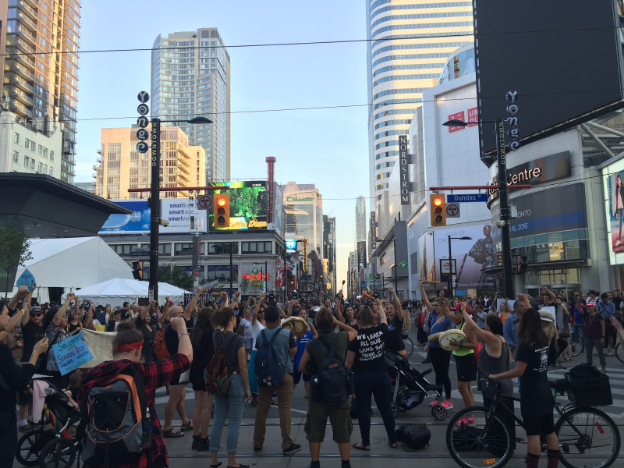Yesterday afternoon nearly 100 demonstrators marched through downtown Toronto to protest the North Dakota Access Pipeline marking Toronto’s third solidarity demonstration with Standing Rock.
The $3.8 billion pipeline would extend from North Dakota’s Bakken oil fields to carry around 500,000 barrels of crude oil a day through South Dakota, Iowa, and into Illinois.
Members of the Standing Rock Sioux Tribe and hundreds of other Indigenous communities across North America have since joined the resistance.
“We don’t believe in borders as First Nations people, we believe that this is all Turtle Island and that women are water carriers. That’s why we came out today, because we want to protect the water,” Sigrid Kneve, a Mohawk organizer of the Toronto event, told rabble in an interview.
Just one day after last week’s action outside the U.S. consulate in Toronto, federal Judge James Boasberg denied the Standing Rock Sioux Tribe’s request for an injunction against the U.S. government over the pipeline.
Shortly afterwards, the U.S. Department of the Interior, Department of Justice and Army Corps of Engineers intervened and issued a joint statement that temporarily halted all construction on the pipeline until another Environmental Assessment is completed.
While many celebrated the White House’s decision to step in, others saw it as a call to action. “Some of us see this as a stalling tactic to appease the Land Defenders [and] Water Protectors at Standing Rock, thinking this will cause a [dispersal] of peoples at the encampment,” organizers explained on the Toronto Day of Action Facebook page.
Peaceful actions swept across the United States yesterday — including one in Washington, D.C. where almost 3,000 people demonstrated — for what was called the National Day of Action against the Dakota Access Pipeline.
Toronto organizers and demonstrators in solidarity with the actions gathered outside the Toronto Stock Exchange building at the intersection of York and King streets in the late afternoon.
Organizers Carrie Lester, Sigrid Kneve, Claire Bramham, and Sue-Lynn Manone explained that having the action outside the Toronto Stock Exchange had great significance.
“Enbridge has shareholders and Toronto Dominion bank, Scotiabank, and Royal Bank of Canada are all involved with extraction, and so that’s why we were down in that core today, in the business district core. And we’re not going to stop,” Kneve told rabble.
The group blocked traffic at the York and King intersection by holding hands in a circle, drumming, and chanting “water is life,” “we stand with Standing Rock,” “no more pipelines,” and “you can’t drink oil, keep it in the soil.”
The demonstrators marched down King Street towards the Toronto International Film Festival (TIFF) festival grounds, where police and TIFF security guards blocked demonstrators from continuing at the King and Duncan intersections.
Demonstrators gathered outside the blockade, sang songs, announced that a van would be leaving Toronto for North Dakota to deliver supplies and materials, and sat down chanting for nearly 20 minutes before walking up Duncan towards Queen, where traffic came to a standstill again.
From there, the group marched down Queen, stopping at the Queen and University intersection and the Old Courthouse — where mounted police joined the police escorting the rally — before marching up Yonge Street to end the rally at Yonge and Dundas Square.
Throughout the rally, organizers asked participants to turn their signs outwards, facing pedestrians and cars. “We are doing this for their benefit,” Carrie Lester, an organizer, told the rally.
“Every person realizes, whether they’re First Nations or not, that we all need water. And the world that we’ve created is not working,” Kneve explained after the demonstration.
Kneve told rabble that the Toronto-based actions are growing in numbers and support, “It’s grown each time. All people are starting to realize that water is life, and our lives are more important than driving our cars,” Kneve said.
“It’s going to take all of us to stop our dependency on oil,” she said.
Sophia Reuss is a Toronto-based writer, editor, and is a recent graduate of McGill University. She’s interested in how online media and journalism facilitate public accessibility and conversation. Sophia also writes and edits for the Alternatives International Journal. She was rabble’s 2016 summer intern.
Photos: Sophia Reuss






